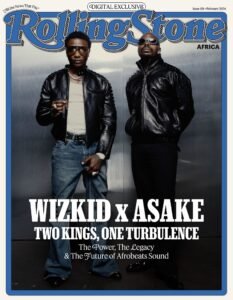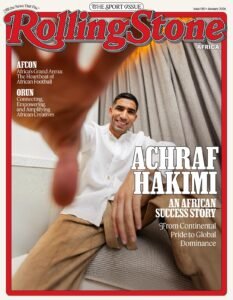Our Future of Music list spotlights the African artists we’re most excited about this year, highlighting a vibrant mix of emerging talent from across the continent. Discover a young trailblazer at the forefront of the hip-hop resurgence in South Africa, a pop artist redefining the genre in Uganda, and groundbreaking artists from the Democratic Republic of Congo, Cabo Verde, Ghana, and Zimbabwe who are transforming the sound of dance music at home. As the global appetite for genres like amapiano continues to soar, these artists are leading the way in shaping Africa’s musical future.
It’s no secret that Africa has consistently nurtured exceptional talent in music, arts, and culture. However, for the first time in history, the continent’s musical output is steadily influencing the trajectory of global pop music. This influence is evidenced by chart-topping dance tracks achieving global recognition on platforms such as Shazam and an unprecedented number of entries on the Billboard Hot 100 chart. Consequently, the international community is observing these developments with increasing interest. Major record labels are actively vying to secure partnerships with prominent African artists, and digital platforms such as TikTok are facilitating the accelerated dissemination of music and culture.
The growing popularity of genres such as afrobeats and amapiano signifies a dynamic shift in the global music landscape, capturing the attention of audiences and industry players worldwide. Back home, a constant stream of new genres bubbles to the surface, reflecting Africa’s diverse cultural influences and artistic experimentation. Moreover, established genres are being revitalized by a fresh wave of talented artists who are drawing inspiration from both local traditions and international trends. This creates a uniquely fertile environment, rich with potential for growth and artistic evolution.
Our Future of Music cover stories might touch on some familiar sounds, but will hopefully guide you toward uncharted sonic territories. Consider, for instance, the burgeoning alternative music movement in South Africa, a vibrant scene propelled by the raw energy of black punk rock bands and the innovative explorations of Gen Z jazz collectives. Or the ever-evolving Francophone rap scene, influenced by sounds of the past while offering a new perspective on contemporary political and cultural issues. These movements are not simply rehashing old sounds; they are forging entirely new pathways, blending influences and pushing creative boundaries in ways that promise to shape the future of music as we know it.
Meet The Future of Music 2025 Artists:
Rebo Tchulo is a rising artist representing the strength and creativity of Congolese women. Since launching her career in 2017, she has become a promising voice in the country’s music scene. Her signature sound blends hip-hop, R&B, and Congolese influences, appealing to a new generation. Tracks like “Cœur Fragile” (2017), “Biloko” and “Ni Nani” (2019), and “Mbote” (2020) gained her initial recognition, but her 2021 hit “Pepele” marked her breakthrough.
Rebo’s music is characterized by musical richness, warmth, and captivating percussion. She combines these elements with modern influences to create a uniquely feminine, powerful, and unapologetic style that reflects her identity. “My inspiration comes mostly from my Congolese roots-the musical richness, the warmth, those percussion sounds that grab you from the very first note. I blend them with more modern influences to create a style that truly reflects who I am: feminine, powerful, and unapologetic,” the songstress explains.
Joshua Baraka has emerged as a leading voice in Uganda’s pop music scene. The 24-year-old singer/songwriter, producer, and multi-instrumentalist resonates with local listeners while possessing the potential for global appeal. Baraka gained widespread recognition two years ago with his viral hit NANA, which propelled him to stardom. His subsequent achievements include nominations for Trace and AFRIMMA awards, touring Europe as the opening act for Bien, collaborations with artists like Joeboy, Ghetts, JAE5, and FAVE, and being named a Spotify Africa Radar artist.
“Uganda has a lot to offer the world. I just try to present that and get more eyes to look at us. It feels good to know your people have your back.” he shares. For now, he is focused on pushing the limits of his own craft and cultural influence with hopes of blazing a trail for others to follow. “I’m trying to put myself in a position where I can put more people on,” he says. “To set up an eco-system around me of things that [go] beyond just me as an artist.”
Usimamane is taking South African rap global. At 21, he is part of a growing group of young artists leading the resurgence of hip hop in the region, following the challenge brought about by more popular genres like Amapiano. Blending global sounds with local influences, Usimamane seems to have hit the sweet spot. With numerous accolades under his belt including a major signing to GAMMA where he released his chart-topping debut album “20th: Days Before Maud” he is poised to lead the next generation as one of Rolling Stone Africa’s Future of Music Cover Stars.
Ronisia, born in Cape Verde and raised in France, has cultivated a unique musical signature blending zouk, R&B, dancehall, and Cape Verdean influences. Her growing popularity with a young, cosmopolitan audience was confirmed in 2024 when she sold out the Zénith in Paris, marking a significant milestone in her career.
Ronisia’s got the accolades to prove she’s a star: a gold record, loads of hit songs, a BET nod in 2021, and a Flamme Award for best new female artist in 2023.
She continues to make her mark, shaping what pop music sounds like for her generation and putting Cape Verde on the map worldwide.
Widgunz is one of the leading figures of the new generation of Rap Ivoire, a movement that’s shaking up hip-hop in Côte d’Ivoire by mixing local slang, urban beats, and influences from Africa, France, and the US.
In July 2024, he released his seventh project, the album Peugeot Music, proving he’s still pushing Rap Ivoire forward. This movement, driven by a new wave of talent, gives a powerful voice to Ivorian youth and is now one of the continent’s most dynamic music scenes-with Widgunz as one of its brightest symbols.
He has this to say about the ever evolving rap scene for Francophone artists: “I think Rap Ivoire is made up of many artists, each with their own style and touch, and the efforts of everyone involved help the movement grow and attract a bigger audience.”
Xlimkid, real name Henry Boakye, is a 21-year-old trap artist who’s not afraid of putting raw emotion into his music. He blends hard-hitting trap beats with deep, reflective lyrics, making him a standout artist on the continent.
Starting out in Kumasi, he’s now a major player in Ghana’s music scene, and has already worked with big-name rappers before even dropping his first album. But every part of his story from birth to his presence in Ghana’s music scene indicate an ordination orchestrated by a divine force. “My mind is so powerful that anything I think about, I know that it’s going to happen regardless of how long it might take,” Xlimkid explains.
Tanzanian pop sensation Abigail Chams distinguishes herself in the regional music scene. Classically trained in five instruments and multilingual (English, KiSwahili, and French), her talent was quickly recognized by Sony Music Africa, who signed her in 2022 after just one single.
Her musical style blends afro-rnb with Tanzanian genres like Taaraab and Bongo Flava, occasionally incorporating amapiano, all evident on her 2023 debut EP “5.” Her most recent single, Me Too featuring Harmonize, demonstrates a natural evolution of her sound, featuring familiar soulful production with enhanced vocals and melodies.
Gemma Griffiths carries Zimbabwe in her voice, blending homegrown stories with global musical fluency. With her debut self-titled album on the way she is set to take over the world as one of Rolling Stone Africa’s Future of Music Cover Stars.
“This album is ten years in the making,” she said. “It’s a love letter to Harare, to the city hustle, to heartbreak, faith, joy, and every beat that has shaped me.” Executive produced by Manuchie and featuring voices like Feli Nandi, Nutty O, and Peruzzi, the album is both sonic memoir and cultural document. “I wanted the visuals to feel like home too, everything was shot in Zim,” she shares





